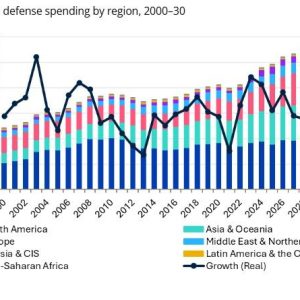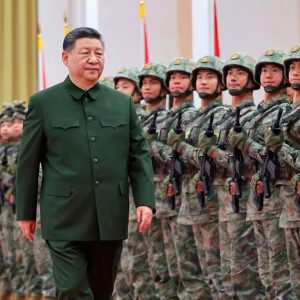Rethinking U.S. National Priorities Amid Rising Global Military Threats
In an increasingly unstable global environment, the long-dormant “guns versus butter” debate has reemerged as a vital policy discussion. With geopolitical tensions escalating across the Indo-Pacific, Eastern Europe, and the Middle East, the United States must grapple with a fundamental economic question: how to balance defence spending with domestic welfare priorities.
As adversaries like China and Russia invest aggressively in military modernization, the U.S. risks falling behind if it does not reevaluate its strategic priorities. The time has come to initiate a serious, bipartisan conversation about what kind of nation America wants to be in the next decade—and what it must be prepared to sacrifice to maintain peace through strength.
What Is the ‘Guns Versus Butter’ Debate?
The phrase refers to the classic economic trade-off between a nation’s investment in military capabilities (guns) and domestic programs (butter) such as healthcare, education, and infrastructure. Historically, democratic societies have struggled to strike a sustainable balance between these competing demands.
Today, however, the stakes are far higher. The U.S. faces a growing threat environment while also contending with inflation, a mounting federal debt nearing $35 trillion, and persistent internal divisions. The question is no longer theoretical: every dollar spent on social services is a dollar not spent on defence preparedness—and vice versa.
Strategic Realities Demand Defence Reinvestment
China and the Indo-Pacific: A Clear and Present Challenge
China’s defense budget has grown to an estimated $315 billion in 2024 according to SIPRI, up from $240 billion in 2019—a staggering increase. The People’s Liberation Army Navy (PLAN) is now the world’s largest by ship count, and Beijing’s assertive posture in the Taiwan Strait and South China Sea shows no sign of abating.
To deter China, the U.S. must ensure a robust forward posture in the Pacific. That requires sustainable funding for naval shipbuilding, long-range strike platforms, cyber warfare, and force readiness—all of which compete for budget space with domestic programs.
Russia and Europe: Ukraine Is Just the Beginning
Despite sanctions and economic strain, Russia has doubled down on military spending, reaching $148 billion in 2024. The war in Ukraine has become a protracted battle of attrition, with NATO allies ramping up support to Kyiv and reinforcing eastern flanks.
The U.S., as the backbone of NATO, must maintain credible conventional and nuclear deterrence in Europe. That includes continued investment in munitions production, logistics networks, ISR (intelligence, surveillance, and reconnaissance), and allied interoperability.
The U.S. Budget Cannot Do It All
In 2024, the United States allocated nearly $997 billion to defence—yet this represents only a fraction of mandatory spending, which includes entitlements like Medicare, Medicaid, and Social Security. These programs are politically sensitive and financially unsustainable in the long term.
Defence leaders and economists alike warn that without structural reform, the U.S. may find itself forced to make cuts to its national security apparatus at precisely the moment it needs to expand it. A national dialogue is overdue.
“A serious republic cannot pretend that it can have both infinite butter and unlimited guns without consequences,” wrote the original article’s author, calling for greater public honesty and political leadership.
The Need for Political Courage and Public Consensus
Reframing the national conversation around strategic trade-offs is not just prudent—it’s essential. Policymakers must articulate the connection between national defence and national prosperity. A well-defended nation creates the conditions under which economic growth, innovation, and civil liberties flourish.
However, this will require elected officials to confront hard truths and explain to the public why tough choices are necessary. The politics of “free everything” must give way to an era of sober, values-based budgeting.
A Call to Action for NATO Allies
While the U.S. leads the way, it must also encourage NATO members to reevaluate their own guns-versus-butter trade-offs. Europe’s peace has long been subsidized by American security guarantees. Now, greater burden-sharing is needed to deter aggression and preserve the international order.
Conclusion: National Security Is a Moral Imperative
The guns-versus-butter debate is not simply about numbers—it is about national identity, priorities, and values. In a world where authoritarian powers are willing to sacrifice butter for guns, democracies must decide whether they are willing to defend their way of life.
Without a clear strategy and the will to finance it, the U.S. risks strategic insolvency. Now is the time to act—not react.












